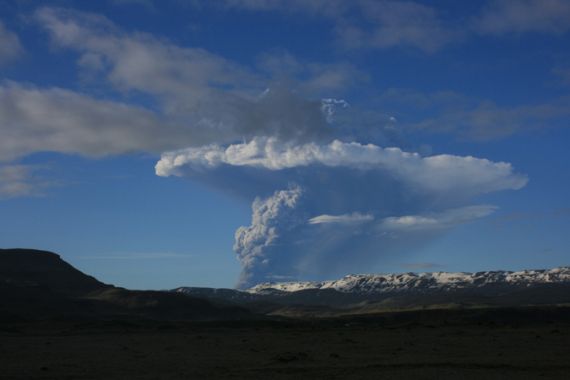Iceland’s most active volcano erupts
Iceland’s most active volcano erupts but experts predict low risk of air traffic disruption.

Iceland’s most active volcano has started erupting, but experts say that it is unlikely to cause a repeat of the disturbance to European air traffic caused by another Icelandic volcano last year.
The country closed its main international airport on Sunday, a day following the eruption of the Grimsvotn volcano, which blasted a cloud of smoke and ash 20 kilometres into the air.
Keep reading
list of 4 itemsAre seed-sowing drones the answer to global deforestation?
Rainfall set to help crews battling wildfire near Canada’s Fort McMurray
The Alabama town living and dying in the shadow of chemical plants
The eruption began with a series of small earthquakes on Saturday.
“It can be a big eruption, but it is unlikely to be like last year,” Hjorleifur Sveinbjornsson, a geologist at the Meteorological Office, told Reuters news agency, referring to the April 2010 eruption of the Eyjafjallajokull volcano.
Last year’s Eyjafjallajokul eruption kept some 10 million air travellers in limbo worldwide for five days, after winds pushed the volcanic ash cloud toward some of the world’s busiest airspace and led most northern European countries to ground all aeroplanes.
The Grimsvotn volcano, located under the uninhabited Vatnajokull glacier in Iceland’s southeast. Its previous eruptions have lasted between a day and several weeks, its last being in 2004.
Scientists have been expecting a new eruption and have said that this volcano’s eruption will likely be small and should not lead to air travel chaos.
But whether widespread disruption occurs again will depend on how long the eruption lasts, how high the ash plume rises and which way the wind blows.
Isavia, the company that operates and develops all airport facilities and air navigation services in Iceland, enforced a no-fly zone for 120 nautical miles (220 kilometres) in all directions from the eruption.
An Isavia spokeswoman described this as standard procedure around eruptions.
“The plume of smoke has reached jet flying altitude and plans have been made for planes flying through Icelandic air control space to fly southwardly tonight,” Hjordis Gudmundsdottir, the spokeswoman, said.
A plane from the Icelandic Coast Guard carrying experts from the University of Iceland will fly over the volcano and evaluate the situation.